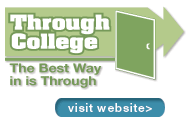Phi Delta Kappa International, a 100 year old professional association for educators, has awarded Harvard University ThroughCollege Fellow Helen Janc Malone with an Innovation in Education Grant Award. The grant will assist in the ThroughCollege grounded theory research focusing on how low-income juniors and senior in urban public schools make meaning of their college information gathering experience? The study intends to shed light to the common themes and experiences youth might experience in their college application process that could open a dialogue about ways guidance counselors can modify their college guidance techniques to better assist students in the ever-changing and dynamic world of higher education. Results from this study will be made available on the ThroughCollege website resources section.
Entries tagged with “school counselors”.
Thu 4 Sep 2008
Innovation in Education Grant Award
Posted by admin under Uncategorized
No Comments
Thu 4 Sep 2008
The Opportunity for Innovation of College Guidance
Posted by admin under Uncategorized
No Comments
I interviewed an old friend and a great education thinker, Helen Janc Malone who is a Doctoral Candidate in Education Policy, Leadership, and Instructional Practice at Harvard University Graduate School of Education. Helen and I were colleagues at the University of Maryland a handful of years ago. I knew she was knowledgeable and passionate about the issue of student pathways to college and asked her a few questions pertaining to college guidance counseling, our specific interest.
Darin: Do you think there is a need for better or more college guidance counseling for high school students?
Helen: The main problem is that the ratio is extremely large in most high schools, which means that counselors can’t effectively track individual student progress and really learn about their personal interests for college/career. Although some guidance counselors create school-wide college days, workshops, and small group counseling, it is often not enough. This posses a particularly big problem in large urban schools, where potentially future college kids might be overlooked. The “solution” really involves a culture change on the part of districts and principals. If they want to see more kids graduate and go on to college, they need to support their guidance counselor staff (hiring more staff, providing professional development opportunities, and integrating their programs into the curriculum). Parents also need to be involved through parent workshops on college access, which really ought to start in middle school, as it happens in affluent neighborhoods. Finally, students need to be given a better roadmap of what their responsibilities are to reaching college and more importantly, staying in college.
Darin: Do you feel there is a need for high school students to have a better personal development experience as a result of that application process, meaning they have a special opportunity for personal discovery, learning, and skill and identity development because of having to go through that significant college application process?
Helen: I think an application process is a great way for teens to gain fundamental writing and communications skills, learn how to market themselves, do some self reflection on who they are, where they are going, overarching goals, personal strengths/weaknesses. In that respect, you could benefit from developing a series of pre-application worksheets or workshops to get students to think about those holistic issues, write them down, share in small group discussions, and talk to their families about. All this would open the door to richer discussion, reflection, feedback, that would lead to good application. This is particularly an important exercise for kids who weren’t considering college but were doing well in school or had overall potential.
Darin: Do you feel that individuals other than guidance counselors (like teachers, mentors, parents, etc.) can provide a sort of pro-am guidance counseling if they had a system of activities to work with on students.
Helen: Yes. I think teachers have a role in encouraging students to seek counselors for advice, read materials about colleges, work with parents and staff to develop workshops on getting into college. Teachers can also use their writing assignment to reflect application or college essays to prep students better. There is a lot of room for innovation, but to get there you need to address the pressures teachers have to “show performance” (NCLB stuff). Perhaps, creating an after-school program (e.g., GEAR UP) could help educate both parents and teens about the college access issue. This could be valuable for community members as well (perhaps, there are unutilized resources or some of them might want to reenter higher ed).
Darin: Finally, who do you think would want a system of activities for college application prep and self discovery? The school? Counselors? School district? Certain non profit orgs? Parents? Parent groups?
Helen: All of these groups could benefit from a comprehensive college access program that encourages collaboration across these stakeholders, provides input and opportunities for each group, and utilizes existing community and school resources to motivate students and provide them support as they think about college.
Authors: Helen Jance Malone & Darin Eich, Ph.D.
